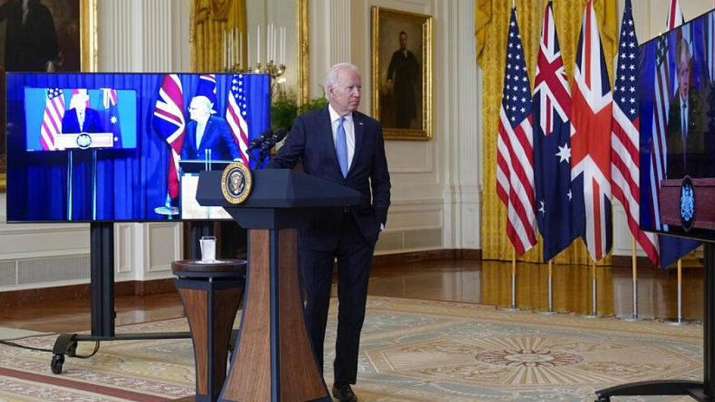
Joe Biden with Australian PM Scott Morrison and British PM Boris Johnson during the unveiling of AUKUS.
The US has ruled out adding India or Japan to a new trilateral security partnership with Australia and Britain to meet the challenges of the 21st century in the strategic Indo-Pacific region. On 15 September, US President Joe Biden, Australian Prime Minister Scott Morrison and British Prime Minister Boris Johnson jointly announced the formation of the trilateral security alliance AUKUS, under which Australia would get a fleet of nuclear-powered submarines for the first time.
“The AUKUS announcement last week was not meant to be a signal, and I think the message the President sent to (French President Emmanuel) Macron as well, that there is no one else who will be involved in security in the India-Pacific,” White House Press Secretary Jen Psaki told reporters at her daily news conference on Wednesday.
Saki was responding to a question whether countries like India and Japan, whose leaders will be in Washington for the Quad summit earlier this week, be made part of the new security alliance. The quad includes India, the US, Japan and Australia. US President Joe Biden is hosting the Quad Summit in person for the first time at the White House on September 24.
“On Friday, you will have Australians (for the Quad summit). But then you will also have India and Japan. Would you imagine the same kind of military role for them that you have now defined with Australians?” A journalist asked.
“AUKUS? What will it become? JAUKUS? JAIAUKUS?” Saki said in light-hearted moments before answering the question.
AUKUS, a trilateral security alliance seen as an effort to counter China in the Indo-Pacific, will allow the US and UK to provide technology to Australia to develop nuclear-powered submarines for the first time.
China has sharply criticized the trilateral alliance, saying such a special grouping has no future and would seriously undermine regional stability and aggravate the arms race and harm international non-proliferation efforts.
The move has also angered France, a European ally of the US, which said it was “stabbed in the back” and publicly expressed its outrage at the AUKUS alliance. It recalled its ambassadors to the US and Australia after the announcement of the AUKUS security deal. France also lost a lucrative contract to build conventional submarines to Australia.
Meanwhile, in a bid to improve ties, President Joe and his French counterpart Emmanuel Macron agreed on Wednesday that open consultations between allies on matters of strategic interest to France would help better the situation. A joint statement after the meeting said Biden and Macron have decided to begin a process of in-depth discussions, aimed at creating conditions to ensure trust and proposing concrete measures for common objectives.
“Of course, this is an important topic in dialogue with countries that have a direct interest in this area,” Psaki said at a White House briefing on Wednesday.
Read more: AUKUS agreement discussed during G7 summit in Cornwall: report
.